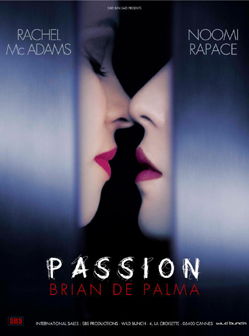FROM KEITH UHLICH AND MORE
 Reviews of Passion are proliferating-- here are some samples:
Reviews of Passion are proliferating-- here are some samples:Keith Uhlich, Time Out New York
"The mood isn’t one of white-knuckle suspense so much as white-noise allure: Every element seems a little too perfectly placed, to the point that we’re always waiting, mesmerized and on edge, for the other shoe to drop. Murder is, of course, on the horizon, captured in a typically bravura split-screen sequence juxtaposing a masked stalker’s throat-slitting adventures with a performance of the Jerome Robbins–choreographed ballet Afternoon of a Faun. The film also seamlessly shifts between the antiheroines’ perspectives—throwing our allegiances off-balance, even moving in and out of the world of drug-addled dreams until we don’t have a leg to stand on. (A scene in which a high-heel model, shot enticingly from the waist down, takes an ankle-busting tumble is this mischievous movie in miniature.)"
Michael Koresky, Reverse Shot
"If it’s difficult to tell what’s business and what’s personal in the film’s intricate set-up, it’s even harder to separate reality from fantasy as the film slithers along to its boffo third act. Here is where De Palma breaks most drastically from Corneau’s film, plummeting down a rabbit hole of delirium that proves he was just using the original narrative as a basic skeleton to indulge in the ridiculous sublime. Whereas Corneau set his narrative up in a clinical and cold-blooded manner (perfectly acceptable for the sleek austerity of the setting), De Palma plunges into excess, positing the characters’ actions as dreams within dreams, and using nightmarishly canted frames and elegant split-screens to toy with both the audience’s perspective and his characters’ subjectivity (Pino Donaggio’s driving, tango-ish score begins to have an identity crisis of its own, starting to sample bits from Debussy’s 'Prélude à l’après-midi d’un faune,' foreshadowing a thrillingly staged ballet scene). There’s an audacity to this that elevates it far above matters of style: De Palma is making pliable a rigidly established film that had clear emotional in and out points, reconfiguring its emotional makeup in a way that confuses, or even rejects, easy identification—with both character and reality."
Glenn Heath Jr., San Diego City Beat
"Brian De Palma's lustrous thriller Passion is one nasty parlor game. It constructs a sleek 21st-century world where fantasy is as pervasive as technology or sex. The desire to fulfill such urges drives us to befriend and betray, compete and consume.
"Hints of primary color populate the crisp modern architecture and décor, giving reality a dreamlike glow and infusing delusions with a scary sense of contorted normalcy. Sometimes, even hallucinations have hallucinations."
Sean Burns, Philadelphia Weekly
"Such are the vagaries of arthouse distribution these days that works by the masters now premiere on your cable box. Following in the footsteps of Terrence Malick’s To the Wonder and Paul Schrader’s The Canyons, Brian De Palma’s Passion opens this weekend in a scant few cinemas, but is already available via Video on Demand. I wish it were possible to see Passion on a big screen locally because it’s a kinky corker, the most gloriously lurid and downright De Palma-est Brian De Palma movie since 2002’s Femme Fatale, which I may have once watched twice in a row just to soak in all the sleazy, giddy abandon. (I might have done the same with Passion, but I’m not ready to admit as much in public just yet.)"
Marshall Fine, Hollywood and Fine
"Passion isn’t Brian De Palma’s first remake, but it may be his worst: an over-inflated, melodramatically hot-blooded version of what was a cool French thriller."
Drew C. Taylor, U.K. Film News
"A significant, and powerful change made by De Palma was in making the lead characters closer in age. The competitiveness has a more natural feel, like the kind that might arise between siblings. This shift in the interpersonal dynamic between Christine and Isabelle helps the film focus on the occasionally poisonous dynamic between women in the workplace without also bringing in the psychological baggage of age.
"With Rachel McAdams, De Palma attempts to give us a femme fatale we ultimately hate ourselves for desiring. So selfish, so self serving, so morally thin and sadistic, McAdams presents a Christine who fears – at any moment – she could be interchanged with any colleague, especially Isabelle. So hungry for power and recognition, Christine is the embodiment of everything a person could come to fear in a co-worker."



